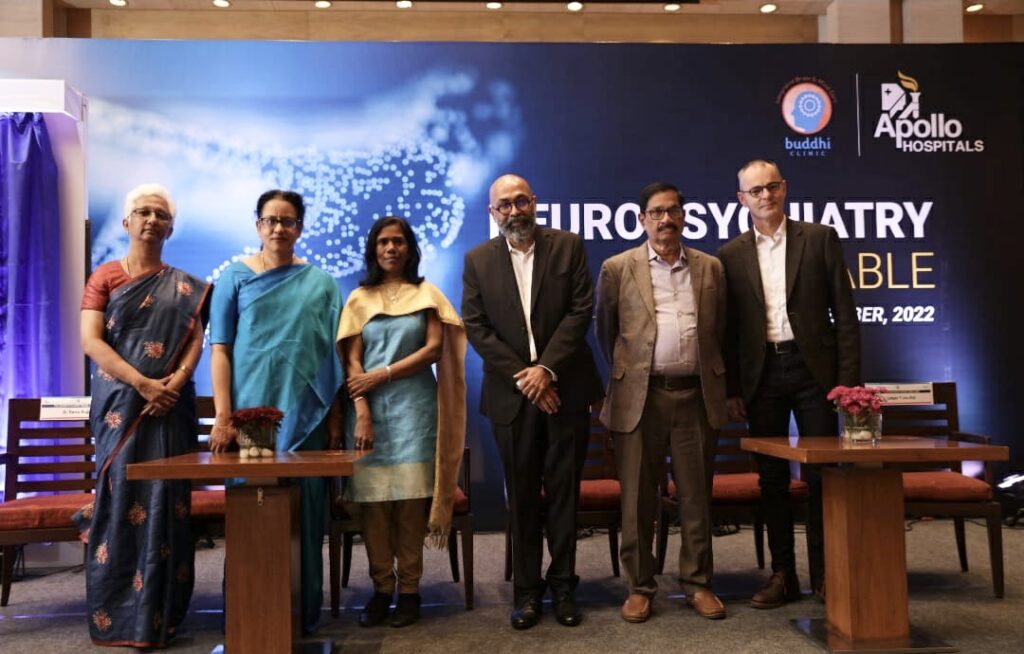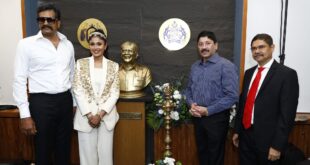
Chennai, December 2022: Apollo Hospitals and Buddhi Clinic together with the International Neuropsychiatric Association organies Neuropsychiatry Roundtable 2022. Especially post Covid many are experiencing a surge in mental health conditions or mental disorders. The world needs to think innovatively and improve the systems of care to meet the demand and provide the best care for affected. This open forum is being organised to create awareness about brain and mind health.
When we think of neurology and psychiatry, we consider them as two distinct disciplines, as different as chalk from cheese. For the clinical practitioner and indeed for those working in community and public health, the two are not that different, and there is a broad and considerable interface.
The 18th century practitioners and opinion leaders in Europe did not consider neurology and psychiatry as distinct; European neurologists for example described behaviour as an “epilepsy equivalent”. Sigmund Freud, who started his career as a neurologist, went on to develop his psychoanalytic theory of emotional symptoms, which over time resulted in an expending schism between neurology and psychiatry. The two specialties began to come together once again with the advent of neuroscience in association with the development of biological sciences and pharmacology. Drug development, brain imaging, genetics, molecular biology and immunology have transformed our ability to visualise what goes on in diseased brains. Today neurology and psychiatry share a broad interface in clinical care, science and public health and this is what The Neuropsychiatry Roundtable is focused on.
Professor Gagandeep Singh, President of the Indian Academy of Neurology, said, “There is no doubt today that the links between the brain and mind are stronger than ever before and that there is a broad interface between the disciplines of neurology and psychiatry. People with cognitive, behavioural and disability needs need collaboration between the specialties as well as multidisciplinary care and support. In this context The Neuropsychiatry Roundtable organised together with the International Neuropsychiatric Association gives opportunity for such discussion and deliberation and will lead to substantive advancements in clinical care.”
Professor Ennapadam S Krishnamoorthy, Founder- Buddhi Clinic, Senior Clinical Advisor- Neurosciences, Apollo Hospitals and Past President, International Neuropsychiatric Association highlighted, that, “The clinical and public health impact of neurodegenerative disorders, prevalent in the elderly is increasing. The impact of these conditions is both neurological and psychiatric with several general medical co-morbidities like Diabetes, Hypertension, Obesity and High Cholesterol being active contributors. These patients have orthopaedic, cardiac, respiratory, gastro-intestinal and uro-gynaecological co-morbidities, resulting in multi-specialty clinical needs and multi-disciplinary clinical approaches. It is here that the diversity of therapy and rehabilitation, blending modern science with the wisdom of healthcare traditions as practiced in Buddhi Clinic becomes relevant. We hope to see these comprehensive approaches to neuropsychiatry, elder care and chronic disease management, mainstream themselves, and it is therefore appropriate that we are working together with Apollo Hospitals, Asia’s premier healthcare organisation to co-host this event.
Dr. Rohini Sridhar, Senior Vice President- Medical Service for Hospital Division- Operations, Apollo Hospitals expressed that, “Many specialists in neurology, psychiatry and rehabilitation including a large number from the Apollo Hospitals group were actively participating in The Neuropsychiatry Roundtable. We are excited about the prospect of mainstreaming new comprehensive care models to address these important and unique needs.”
Experts in Neuropsychiatry outlined the clinical and public health importance of this interface discipline, neuropsychiatry. Prof. Valsamma Eapen, Professor of Child Psychiatry at the University of New South Wales, Sydney, Australia and incoming President of the International Neuropsychiatric Association spoke about the importance of childhood neurodevelopmental disability and its impact across the lifespan. Putting focus on autism and her extensive research and clinical experience, she pointed out the lifelong needs that existed for specially designed clinical and rehabilitation services in these sufferers. Professor Ludger T van Elst, Professor of Neuropsychiatry at the University of Freiburg, Germany, talked out how autoimmune diagnosis was changing the face of chronic mental health conditions like schizophrenia. Many patients with autoimmune conditions, presented with neuropsychiatric symptoms he said, requiring a different clinical approach that had potential for symptom reversal and cure. The COVID pandemic and neuropsychiatric symptoms in its context were a clear indication of mental health and neurodisability caused due to infection and autoimmune response. These highlighted the need for active interaction between medical, neurological, psychiatric and rehabilitation specialists he said. Dr. Rema Raghu, Chief Clinical Officer, Buddhi Clinic also spoke.
 Expressnews
Expressnews







